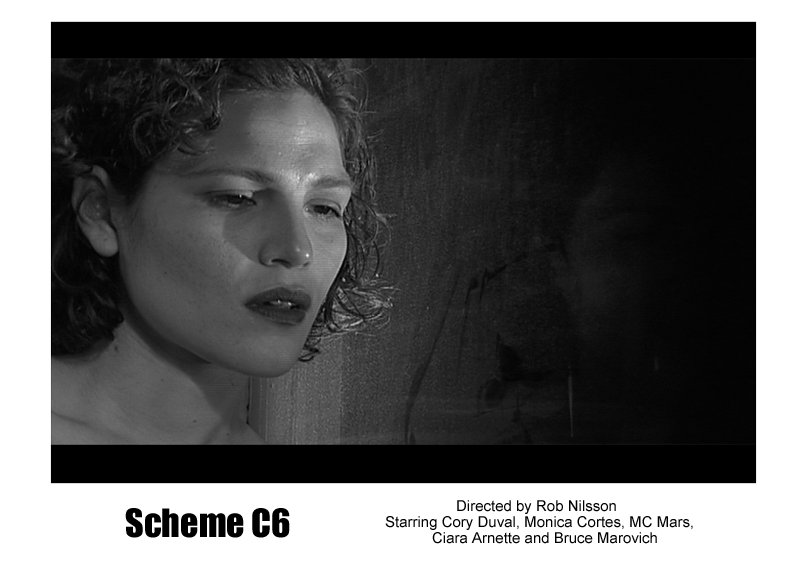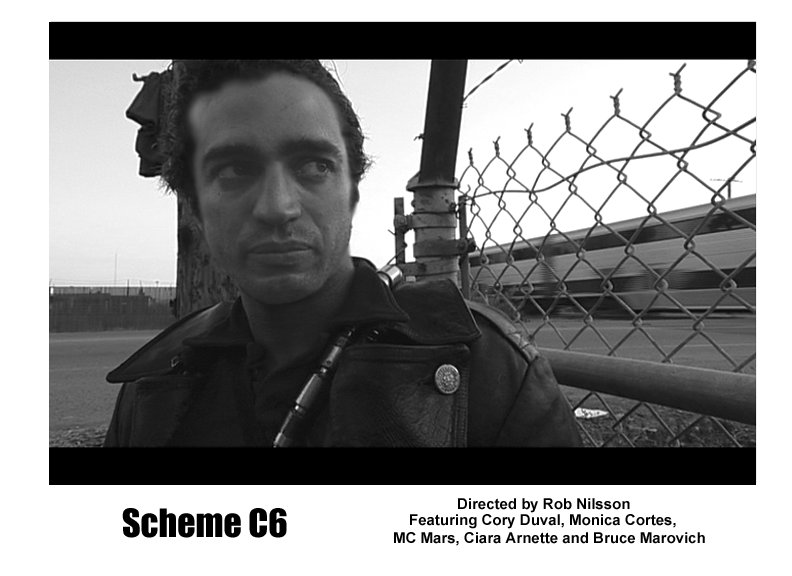
SCHEME C6
SANTA BARBARA FILM FESTIVAL, FEB 28 - MAR 3, 2002
Dir. Rob
Nilsson
Featuring *Cory Duval *Monica Cortes *MC Mars *Ciara Arnette *Bruce Marovich
Date/Time:
March 1 @ 9:00 PM,
Riviera Theater, Santa Barbara CA
Rob Nilsson on hand for Q&A
Produced by 9 At Night Films w/support from nextPix
|
"A bracing bull's eye... a tightly wound narrative that's part genre suspense, part bad-boy psychological sketch... results are very much in the tradition that stretches from Godard's "Breathless" through the '99 Aussie hyperventilator "Head On." -- Variety
|
SCHEME A scheme is a dream with street smarts . but doomed to fail. A modern urban film which recalls I VITELLONI or THE LIZARDS, SCHEME C6 is a film about people with a plan, a self-defeating mechanism, a reach which exceeds grasp. Bid is a self-styled urban commando, determined to live outside the system and the law. A hustler in high end auto parts, he is homeless by choice. All his gear in a storage locker, he plies the city on a motorcycle, counting coup on the cops which include his father who is trying to get him to reconcile with his family -- including his grandfather Ponto. His friend Grey is older and on the decline. A white rapper, with a plan to promote hip-hop acts, he works as a chauffeur, using his limo to help Bid transport stolen parts. Yve is Bid's girl friend: bi-sexual, ambitious but without direction. Neither she nor Bid want to make a commitment, and their high energy relationship mates guerilla warfare with a high tensile romantic innocence. Neither wants to compromise, but their friendship always seems about to go up in flames. Bid's sister Reva, an aspiring singer, is having an affair with Rico, a lawyer Bid believes is fleecing the family and nobody understands Salowitz, Ponto's eccentric assistant. Bid sets up Grey to ask Ponto to fund his music scheme which sets off a tragic series of events. Finally schemes and dreams both give way to something stronger: accident, fate, it's hard to say how the story lines we choose for ourselves suddenly dissolve and we're face to face with a disaster we never saw coming. SCHEME C6 Credits Bid
......
Cory Duval 9 at Night - A Cinema of the Streets 9 from the '90s... bodies in limbo and souls on the lam, in pain or out of pocket, dreamers on a roll and lovers out of luck, secret seekers and losers weepers, at home in the streets but strangers to themselves... nothing you've ever seen before and everything after... NINE AT NIGHT. The
nine stories of NINE AT NIGHT all take place in the homes, streets
and shadowy places of an American city in the '90s. They all begin
at 9:00 PM as last light leaves the sky and night begins. Every
film is linked in some odd way. Maybe its just a stray detail, something
seen outside a window, where characters may witness strangers who
look back at them from their own film. Or maybe there's a larger
context wherein a particular film may affect the circumstances of
one or more of the others. Or the lives of characters can be extended
from film to film, clarified or made more mysterious by their varying
roles in this nocturnal universe. A pattern will emerge for those
who see all the films, but it will not be the solution to a puzzle.
It will be itself an enigma which sends us back to check on details
which continue to haunt and tug at us, as we recognize how the singular
and odd blend with the common and universal in human experience.
|
| READ ON |
|
|
DIRECT ACTION
CINEMA
Today we are witnessing a technological, digital, virtual, cyber- revolution. Pioneers like Lucas' Industrial Light and Magic have ushered in an era where we can as easily browse realistic visions of prehistoric times as look into future eons guided by contemporary P.T. Barnums who make it all look safe and easy. The promise of this technology has already forced Hollywood to buy off the young techno wizards who invented it and jam- fit their anarchy into a form wired for profit. But on the other hand, for those still grounded in the mysteries of our animal natures as they are played out on the concrete and at the ground zeros of homes, work places, bars and clubs, playgrounds and street corners, back alleys and main streets of the world we still live in, this new age also offers amazing opportunities. Here too, the cinema as we know it is obsolete. The budgets, the casts of thousands, the fleets of trucks, the large and inefficient crews, the disruptive and avaricious impositions of pushy producers with laptops and officious undergraduates with walkie talkies herding citizens out of the shot ... all of this is no longer necessary. All of the equipment, mobile dressing rooms, portable soup kitchens, the camp followers of agents, personal assistants, and sycophantic fans which accompany even a smaller movie for TV on location, are now completely superfluous. Why? Lightweight digital video cameras can now shoot complex, fascinating scenes about the human encounter virtually anywhere, unobtrusively, efficiently and with no more lighting than that provided by a single match. Sound technology can pick up a penny dropped on a pavement a mile away. Fast moving stripped down film crews, carrying actors with them can move from location to location in a couple of cars, or a small mini-van, unencumbered by the tons of ordnance required to support a traditional film set. Three people can now do the work of thirty on location and without the endless cachinnation inevitable as cinema armies confront the everyday world which must stop what its doing so that Eddie Murphy can have his scene, or Jack Nicholson complete a temper tantrum.
|
(CON'T) For those not yet ready to surrender human feeling, intuition and the adventure of our short life spans to the mind- numbing ministrations of an industry which wants to anesthetize our pain, reduce the conundrums of living to easy dualities of good and evil and make us forget who we are... for those who are tired of profiteering pushers who will provide us our drug for the price of a monthly cable bill, or an eight buck movie ticket and a tub of popcorn... for those who still feel we are travelling through a mysterious universe filled with beauty and terror, blessed with moments when we feel one with it all and attached by invisible fingers of empathy to all living things... then 9 AT NIGHT FILMS is the sort of cultural work we invite you to support. THE WORK IN PROGRESS In 1991, the Tenderloin Action Group (now the Tenderloin Ygroup) was born. A drama workshop for homeless people and inner city San Francisco residents, it has met every Wednesday night for almost eleven years in an atmosphere crackling with challenge and emotion. The Ygroup's videotapes of those Wednesday night sessions are a collective cry of humanity's pain, outrage, humor, joy and personal catharsis. People from all races and nationalities, bad luck, no luck and down on their luck, people with limited material means but rich in human capacity sit in the "circle of protection" and tell buried truths, look for emotional bridgeheads to blow, encounter the 10,000 selves, the blood, sweat and tears of human confrontation, and bring their personal cries, songs, rants, tantrums, brainstorms, unique visions and quixotic poetry into the circle. In 1996 the first feature film cast from this pioneer group of seekers was completed. CHALK had its U.S. premiere at the San Francisco Film Festival, in April, 1996 and its International debut at the Locarno International Film Festival in August '96. It has since played to sold out audiences at the Toronto International Film Festival and has played theatrical engagements in 15 American cities, making the Village Voice's Top Ten Film list in 2000. Last year the Mill Valley International Film Festival hosted a Special Tribute to Rob Nilsson's work and sponsored three World Premieres of his films, including two, SINGING and STROKE, from the 9 @ Night series. Made with the contributions of labor, services and equipment from top flight San Francisco film artists, technicians and film/video facilities, these films were also financed by the contributions of generous believers in the cause The long standing dream of a cycle of feature films as close to the street as to the bone, made with a committed troupe of unknown street actors, and a top flight crew of dedicated professionals, has now been realised. The Tenderloin Acting Workshop has now been transformed into a rehearsal and production session, where the new films are being developed and produced. Future acting workshops and other community outreach programs are being contemplated and will be announced. Rob Nilsson
and Direct Action Nilsson recently directed A TOWN HAS TURNED TO DUST, a feature film for TV, from a script by Rod Serling. Rob Nilsson's film criticism has been featured on Ifilm and the Adobe Motion Channel and he has a regular editorial column on RES, the world's leading magazine on digital filmmaking. |
|
|

